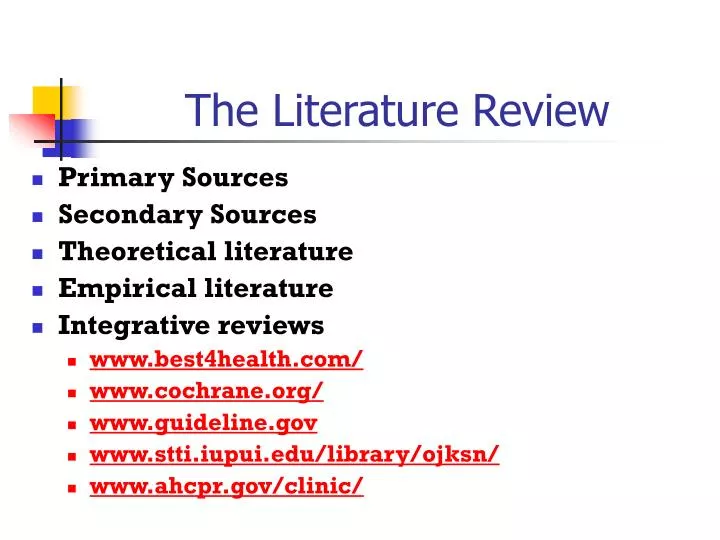

The Literature Review
Mar 22, 2019
720 likes | 3.2k Views
The Literature Review. Primary Sources Secondary Sources Theoretical literature Empirical literature Integrative reviews www.best4health.com/ www.cochrane.org/ www.guideline.gov www.stti.iupui.edu/library/ojksn/ www.ahcpr.gov/clinic/. Definition of a Literature Review.
Share Presentation
- research problem
- research subjects
- empirical research
- inquiry research method
- top 50 research institutions

Presentation Transcript
The Literature Review • Primary Sources • Secondary Sources • Theoretical literature • Empirical literature • Integrative reviews • www.best4health.com/ • www.cochrane.org/ • www.guideline.gov • www.stti.iupui.edu/library/ojksn/ • www.ahcpr.gov/clinic/
Definition of a Literature Review • A systematic and explicit approach to the identification, retrieval, and bibliographical management of independent studies … locating information … synthesizing … developing guidelines …
Purposes of the Lit. Review • Facilitate development of the Conceptual Framework by summarizing knowledge • Clarify the research topic • Clarify the research problem • Verify the significance of the research problem • Specify the purpose of the study • Describe relevant studies or theories • Develop definitions of major variables • Select a research design, data measurement, data collection & analysis, & interpret findings
Ethics and Research • Starts with the study purpose, design, methods of measurement, and subjects • Guidelines for all of these • It is still a concern today • More recent ethical issues are: • Fabrication of a study • Falsification or forging of data • Dishonest manipulation of the design or methods • Plagiarism • 50% of the top 50 research institutions in US have been investigated for research fraud
Ethical Problems in Historyhttp://helix.nih.gov:8001/ohsr/mpa/45cfr46.php3 • Nazi medical experiments (1933-1945) • Tuskegee syphilis study by the USPHS (1932-1972) • Willowbrook study (1950-1970) Hepatitis study • Jewish Chronic Disease Hospital study with live CA cells in 1960s
Ethical Problems in History • University –Atomic Energy Government Exp. • 18 men and women injected with plutonium to determine body distribution (at the time said to be terminal) 1945-47 • 20 subjects ages 63-83 given doses of radioactive radium and thorium inj. or oral. 1961-65 • 64 male inmates at Washington St. Prison had testicular radiation to determine the smallest does to makes someone sterile. 1963-70 • 125 retarded residents were fed radioactive ir9n and calcium to see if a diet rich in cereal would block the digestion of those two minerals. 1946-56
Nuremberg Code-1949 • Voluntary consent • Must yield fruitful results for society • Anticipated results justify the type of experiment • Avoids all unnecessary physical-mental injury • Cannot do studies that have a known injury or death unless the exp. Physician is a subject • Risk does not out weight humanitarian benefit • Proper precautions to prevent injury, dis., death • Conducted by qualified persons • Subjects can always stop the study • Researcher must always be ready to stop the study (risk)
Declaration of Helsinki-1964-84 • Differentiated therapeutic vs. non-therapeutic research • Clinical vs. Basic • Greater care to protect subjects in non-therapeutic research • There must be a strong, independent justification for exposing a healthy vol. to substantial risk • The investigator is to protect the health and life of research subjects
The Belmont ReportThree Ethical Principles • Principle of respect for persons • Right to self determination and freedom to participate or not • Principle of Beneficence • Do no harm to others • Principle of Justice • Treat everyone fairly without discrimination • Led to USDHHS Code on Ethics • Title 45, Part 46 (45 CFR 46) • Office of Human Subjects Research (OHSR) within NIH • http://helix.nih.gov:8001/ohsr
Generally Called Subject Rights • Right to self-determination (can stop the research) • Right to privacy-anonymity-confidentiality • Right to fair treatment • Right to protection from discomfort and harm
Institutional Review Board • IRB review process 4-6 weeks • Consent forms (voluntary subjects) • Disclosure forms • Confidentiality • Compensation disclosure • Ethics documented in the research • Accountability to rules, regulations, and legal entities
Research Problem • The research problem dictates the method of inquiry (research method, or research design)
Problem Clarification>Method • What are the mother’s ages, education level, and marital status for those who have a child with a birth defect from low folic acid intake in Denver County? • There is a significant difference between mothers ages 15-19 having babies with birth defects when placed on supplemental folic acid versus those without the supplements.
Problem Clarification>Method • What is the relationship between mothers ages 15-19 who have effective dietary habits and folic supplement use versus those that do not in relation to the number of birth defects in Denver county. • There is no statistical difference between women ages 15-19 having babies with birth defects from low folic acid intake when randomly comparing Denver to Jefferson Counties
Problem Clarification>Method • How did M. Jones (a 15 y.o.) mother have good nutrition with Folic Acid supplements, still have a baby with neural-spinal tube closure defect? • What is the experience of Jefferson County teen mothers (ages 15-19) caring for babies with spinal cord defect associated with poor nutrition?
Problem Clarification>Method • What keeps teen mothers (ages 15-19) from being nutritionally prepared for pregnancy when they know being sexually active is logically and directly related to becoming pregnant?
Problems • Hypotheses: • Predicts a relationship between variables • More precise than a problem statement • Must be written before collecting the data • Testing the hypothesis is the heart of empirical research • They are never proven, they are accepted or rejected
Problems • Hypotheses • Identify the population, specify the variables, indicate the type of research, indicate variable measurement techniques, suggest an appropriate sampling method, and guide the interpretation of results • Help link theory to reality and back to theory • Encourage logical thinking to reduce misinterpretation
Types of Hypotheses • Simple: predicts a relationship between 1 independent and 1 dependent variable • Null: (or statistical) predicts no relationship • Complex: predicts a relationship with 2 or more independent and dependent variables • Directional: predicts the relationship between the variables (simple or complex) • Nondirectional: no relationship predicted • Research: most commonly used for clarity, is directional and in relational form.
Research Question • Used when knowledge is insufficient or in qualitative studies (exploratory, descriptive) • Written as interrogative sentences-present tense • Identifies the problem • Contains one of more variables • Reflects the problem statement • May or may not be empirical • Focuses on variables and their possible relationships
- More by User
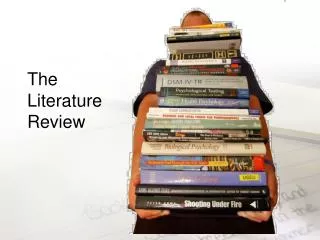
The Literature Review. The Importance of the Literature Review in Research.
923 views • 44 slides

The Literature Review. Dr Areefa Albahri. The Literature Review. The review of the literature is defined as a broad, comprehensive, in-depth, systematic, and critical review of scholarly publications, unpublished scholarly print materials, audiovisual materials, and personal communications.
501 views • 16 slides

The Literature Review. What is a Literature Review?.
923 views • 34 slides
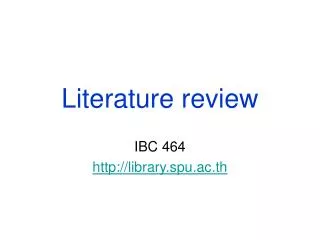
Literature review
Literature review. IBC 464 http://library.spu.ac.th. Please answer these questions. 1 What are the criteria to be most successful in business? 2 Can business research help increase your business performance? How?. How to write a literature review. What is a literature review?
589 views • 10 slides

THE LITERATURE REVIEW
WHAT IS A LITERATURE REVIEW?. A body of research and writing on a particular topic.E.g. ?the literature on public opinion and foreign policy" or ?the literature on democratic stability"A literature review is a systematic examination and interpretation of a literatureCreated to inform and shape su
922 views • 13 slides

The Literature Review. Reasons for Conducting a Literature Review Goals of a Literature Review Contents of a Literature Review Examples. Reasons for Conducting a Literature Review. to identify gaps in current knowledge
3.25k views • 17 slides

The Literature Review:
The Literature Review:. Building a Foundation for Your Research. The review of literature. The research process usually begins with a research question. The researcher will conduct a literature review to identify other research that relates to the research question.
335 views • 16 slides

The Literature Review. Writing in Psychology. 2 sorts of “reviews” The Review Paper – (example slide 3) stand-alone publication found in peer reviewed journals in which a researchers gather LOTS of published evidence and synthesizes it for the purpose of evaluating where the field is at
237 views • 8 slides
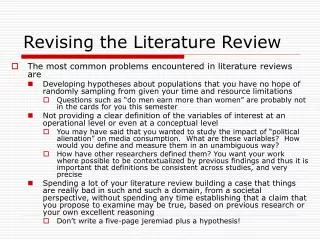
Revising the Literature Review
Revising the Literature Review. The most common problems encountered in literature reviews are Developing hypotheses about populations that you have no hope of randomly sampling from given your time and resource limitations
240 views • 6 slides

The Literature Review. Lecture 7. Organization of this lecture. The Literature Review : Purposes of the Literature Review The Literature Review Process Search Aids, Key Words, Reading, & Notes Writing the Literature Review Referencing.
507 views • 22 slides

The Literature Review. CSE/ISE 300 Spring 2011 Tony Scarlatos. What is a Literature Review?. “... a literature review uses as its database reports of primary or original scholarship, and does not report new primary scholarship itself.”
392 views • 14 slides

Literature Review
Literature Review. Purpose. Foundation of ideas (classics and contemporary) Important themes and models (strands and examples) Touchstone: Meaningful work Comparison, setting the bar How does my works compare with influential works?. Two questions.
434 views • 6 slides
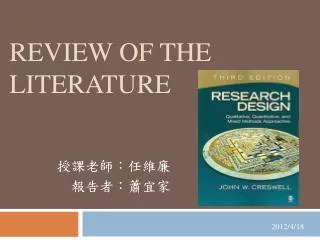

Review of The Literature
Review of The Literature. 授課老師:任維廉 報告者:蕭宜家. 2012/4/18. 作者介紹. John W. Creswell Professor of Educational Psychology at University of Nebraska-Lincoln. He specializes in qualitative and quantitative research designs and methods, multimethod research . Outline. The research topic
477 views • 19 slides

The Literature Review. Demonstrates your familiarity with existing knowledge in the field Directs readers to other literature of interest. Provides sources for your methods. Provides editors with a list of potential reviewers
264 views • 6 slides

The literature review
The literature review. Citation (referencing) patterns What is a literature review? Structuring a literature review Directing the argument and synthesising sources Being critical in your literature review. Integral and non-integral references.
651 views • 15 slides

LITERATURE REVIEW
LITERATURE REVIEW. What is LR?. A literature review discusses published information in a particular subject area, and sometimes information in a particular subject area within a certain time period.
968 views • 47 slides

Review of the Literature
Review of the Literature. The VI Writer’s Workshop. The Objective of the Review of the Literature is to. Zero in on the research that relates to your project. Identify the most important research that has already been done in the area. Get specific information on your research topic.
365 views • 22 slides

The Literature Review. Prof. Nawal A. Fouad. (3). March 2007. The Literature Review.
636 views • 20 slides

http://www.hud.ac.uk/cls/infolit/files/step3_literature_review.ppt 24/8/07. The Literature Review. What literature and where?. What is a literature review?.
162 views • 13 slides

6. Review of the Literature. Learning Objectives. Determine The Purposes For The Literature Review Recognize The Need For Becoming Familiar With The Library's Services Distinguish Between Primary And Secondary Sources In Research Literature Recognize The Importance Of Grey Literature.
682 views • 56 slides

263 views • 15 slides

- My presentations
Auth with social network:
Download presentation
We think you have liked this presentation. If you wish to download it, please recommend it to your friends in any social system. Share buttons are a little bit lower. Thank you!
Presentation is loading. Please wait.
Literature Review: Introduction and Notes
Published by Virginia Hampton Modified over 7 years ago
Similar presentations
Presentation on theme: "Literature Review: Introduction and Notes"— Presentation transcript:
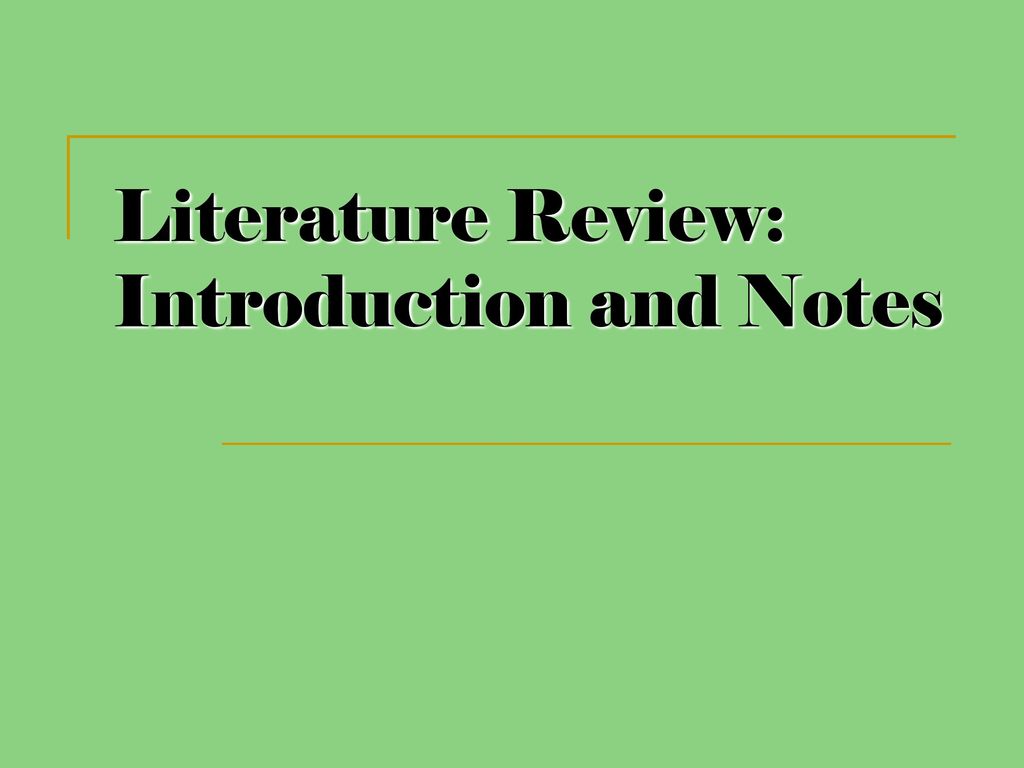
Critical Reading Strategies: Overview of Research Process

Project Proposal.

Literature review Cindy Wee Te Puna Ako Learning centre.

Writing a Research Paper

Thesis Project Nirvana

WRITING the Research Problem.

Literature Review.

Dr. MaLinda Hill Advanced English C1-A Designing Essays, Research Papers, Business Reports and Reflective Statements.

DR. AHMAD SHAHRUL NIZAM ISHA

How to Write a Literature Review

Soc 3306a Lecture 4 The Research Report and the Literature Review.

Northcentral University The Graduate School February 2014

Literature Review. What is a literature review? A literature review discusses published information in a particular subject area, and sometimes information.

Experimental Research Methods in Language Learning Chapter 16 Experimental Research Proposals.

Science Fair How To Get Started… (

How to write a professional paper. 1. Developing a concept of the paper 2. Preparing an outline 3. Writing the first draft 4. Topping and tailing 5. Publishing.

Literature Review. Outline of the lesson Learning objective Definition Components of literature review Elements of LR Citation in the text Learning Activity.

Literature review IBC 464

Literature Review Taken From: University of Washington Psychology Writing Center.

OK. So I’ve Submitted My Proposal
About project
© 2024 SlidePlayer.com Inc. All rights reserved.

IMAGES
VIDEO
COMMENTS
The presentation outlines a seven step model for conducting literature reviews and provides guidelines. It also covers trends like theoretical literature reviews, empirical literature reviews, conceptual frameworks, and critical/analytical frameworks.
A literature review is a critical summary of all the published works on a particular topic. It identifies trends in research. It points out research gaps in existing literature.
The review helps identify what is already known, research gaps, and informs the research design. It also describes the various types of literature reviews, sources of literature, characteristics of a good review, and the steps involved in conducting a review.
A literature review discusses published information in a particular subject area, and sometimes information in a particular subject area within a certain time period. 967 views • 47 slides Chapter 2 – Study of the Problem/Literature Review
11 What is a systematic Literature review? “A review that is conducted according to clearly stated, scientific research methods, and is designed to minimize biases and errors inherent to traditional, narrative reviews.” Margaliot, Zvi, Kevin C. Chung. Systematic Reviews: A Primer for Plastic Surgery Research.
literature review. purpose of a literature review. • provides background information. • provides context for your ideas. • identifies researchers and sources connected to the topic. • reveals how the topic has evolved over time. • uncovers information gaps, discrepancies & contradictions on a topic.
Review • Facilitate development of the Conceptual Framework by summarizing knowledge • Clarify the research topic • Clarify the research problem • Verify the significance of the research problem • Specify the purpose of the study • Describe relevant studies or theories • Develop definitions of major variables • Select a research design, data mea...
Instead, organize the literature review into sections that present themes or identify trends, including relevant theory. You are not trying to list all the material published, but to synthesize and evaluate it according to the guiding concept of your thesis or research question.
It defines a literature review as an examination of previous research conducted in a particular field of study. The purpose is to gain knowledge in the field, identify common methodologies, and determine if the proposed research is needed.
Writing Center coaches can review your literature review at any stage. This workshop presents the by-the-books academic definition of a literature review.